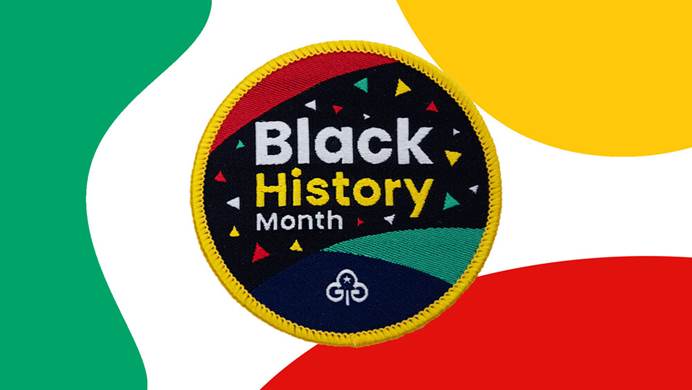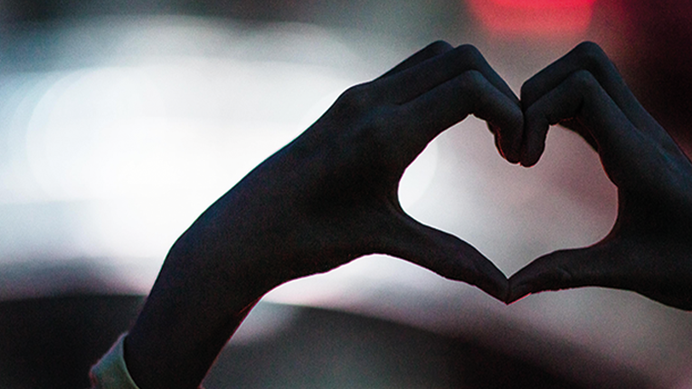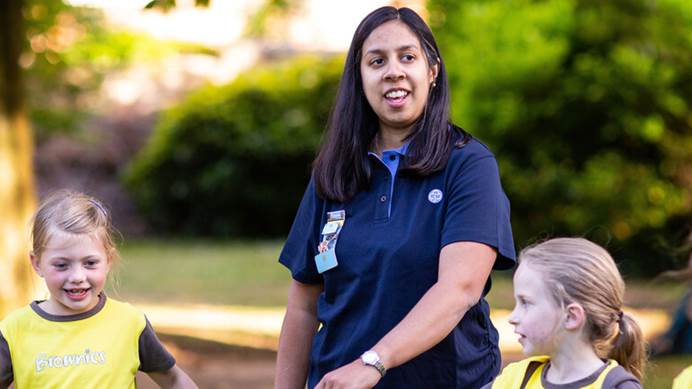People of colour in guiding
Explore these resources to support conversations about race and racism, and understand what it means to be anti-racist
Being inclusive is a core value of Girlguiding and racism has no part in our community or society.
As a movement, we recognise that it isn’t enough to not be racist, we must be actively anti-racist. We support and stand in solidarity with our Black girls, Black volunteers, Black staff, Black parents and carers, and all Black people.
At Girlguiding, we all have a role to play in being actively anti-racist and living out our values of being inclusive and caring for others. To uphold this commitment, we must listen, learn and amplify the experiences of Black people, within Girlguiding and beyond.
The following resources are designed to support conversations about race and racism, and to increase your understanding of what it means to be actively anti-racist. From books to videos to programme resources, we hope there’ll be something in here for everyone.
Black History Month
October is Black History Month in the UK, where people come together to recognise and celebrate the stories of amazing Black people who’ve shaped the country. These stories may have been forgotten about, never told or erased because of racism. Throughout the month, people take the time to find out stories of Black people who’ve made a difference to the country, and celebrate Black culture and history.
You can use our Black History Month unit meeting activities for each section to explore and celebrate Black History Month this year and beyond.
If you were unable to fit these activities into your term plan for last October, that’s no problem, they’re here to stay. And we encourage all units to take part in these activities at some point throughout their guiding year.
Black History Month unit meeting activities
- Rainbows: Hidden histories – This unit meeting activity is an interactive story which explores the life and achievements of Mary Seacole.
- Brownies: Out of sight stories - This unit meeting activity is an interactive story which explores the life and achievements of Mary Seacole.
- Guides: Celebrating sheroes – This unit meeting activity explores the life of Connie Mark, and celebrates the stories of amazing Black women that inspire your Guides.
- Rangers: Unsung stories – This unit meeting activity explores the life of Connie Mark, and celebrates the stories of amazing Black women that inspire your Rangers.
If you’re celebrating Black History Month with your unit, don’t forget to pick up our new Black History Month badge! It’s a great way to make your celebrations really memorable for your unit and show your support.

More activities
If you’ve already done our Black History Month activities, and want more ways to explore Black culture and history with your unit throughout the year, we've launched more activities for you to try.
We’re very excited to be partnered with The Black Curriculum on new activities for every section that are all about celebrating Black, African and Caribbean culture. You might explore carnival with Rainbows, learn about Windrush Day with Brownies, make delicious menus with Guides, or take a deep dive into representation in the beauty industry with Rangers. These are fun, celebratory activities that are designed to be explored all year round.
Find them in the latest edition of Girlguiding magazine.
Talking to children and young people
It’s never too early to talk about race. Babies notice physical differences, including skin colour, from as early as 6 months. Studies have shown that by age 5, children can show signs of racial bias, such as treating people more favourably than others based on the colour of their skin.
We know these conversations might sometimes feel challenging and uncomfortable. But by starting these conversations early, we can prepare young people for working towards racial justice and racial equality.
Resources from our programme
Volunteers might find these programme activities useful for supporting conversations about race and racism in a unit setting.
Inclusion unit meeting activities
We have inclusion unit meeting activities that can help you talk about empathy, diversity, discrimination and allyship, which you might like to use during Black History Month and throughout the year.
- Rainbows: Fuzzy friends - Rainbows can learn about empathy by listening to a story. They’ll see if they can tell if someone feels left out and learn how to include everyone in their fun and games.
- Brownies: Brownie town - Brownies will become town planners in this activity is all about diversity. They’ll design their ultimate Brownie town in Sixes, and then imagine that new Brownies are arriving. What could they add to their town to make sure that any Brownie in the world would feel welcome?
- Guides: My support chain - This unit meeting activity teaches girls how to challenge discrimination in places that are safe to them, like their unit and school. It starts with seeing how they’re similar and then finding out what makes them different from each other, and how sometimes people are excluded or treated differently because of who they are. Then, the unit will create a support chain, thinking about how they can take small actions every day to make their world a better place.
- Rangers: Allies unite! - Rangers will create an allyship manifesto in this unit meeting activity. Working together to create an inclusive future, they’ll learn that help is not always helpful, especially when others don’t listen or ask how they can help. It’s all about how important it is to listen to how and when people want support in the face of discrimination so they can be a good ally. By the end of the activity, they’ll have learnt that allyship is a journey and a commitment to small, everyday acts of inclusion as well as supporting larger campaigns for equality to create a better world.
Other activities about inclusion
And these activities support more general conversations about inclusion - so we’d recommend you use them in the context of more specific discussions about race and racism. You might also want to use some of the resources below on talking to children and young people.
- Rainbows: Uncrumpled friends- This unit meeting activity is from the topic Better together - an activity which explores the longer term impact of the things we say to other people. This activity links to the Rainbow Promise and asks girls to reflect on how they can be kind to everyone. You can find this activity in unit meeting activity pack 8.
- Brownies: Fairest of them all - This unit meeting activity is from the topic Better together - an activity where girls explore discrimination and practise challenging people to be inclusive. You can find this activity in unit meeting activity pack 8.
- Guides: Pick a card - This is a Stage 4 Reflect Skills builder activity where Guides practise taking on a new perspective to help them understand things from someone else’s point of view.
- Rangers: Equality v equity- This unit meeting activity is from the topic Better together - an activity where Rangers explore the differences between equality and equity and reflect on what they could do in their local community. You can find this activity in unit meeting activity pack 8.
Further resources
These resources will help you talk to children and young people about race and racism:
- Talking to your kids about racism: Unicef
- How to talk to your children about race and racism
- Race talk: Engaging young people in conversations about race and racism
- How do we teach our children anti-racism?
- Talking about race: National Museum of African American History and Culture
- Your kids aren't too young to talk about race: Resource roundup
- Show Racism The Red Card resources
- Anti-racism for kids 101: Starting to talk about race
Resources from the BBC
- CBBC presenters on growing up black in the UK
- What is white privilege?
- What inequalities do black people face in the UK?
- Kids tell us about their experiences of racism in the UK
- Advice to help you if you're upset about racism
- ‘We need everybody to speak out to make a change'
- How you can help stop racism
- Newsround special programme on racism
- Blue Peter delivers powerful message for kids about racism and Black Lives Matter
Books for young people
- Brick by Brick, Giuliano Ferri (3-5 years)
- A is for Activist, Innosanto Nagara (3-7 years)
- The Skin I’m In, Pat Thomas (4-7 years)
- Let's Talk About Race, Julius Lester, illustrated by Karen Barbour (4-8 years)
- Don't Touch My Hair! Sharee Miller (4-8 years)
- The Day You Begin, Jacqueline Woodson, illustrated by Rafael López (4-8 years)
- Something Happened in Our Town, Marianne Celano, Marietta Collins, and Ann Hazzard, illustrated by Jennifer Zivoin (4-8 years)
- The Color of Us, Karen Katz (4-8 years)
- Amazing Grace, Mary Hoffman, illustrated by Caroline Binch (6-8 years)
- Malcolm Little: The Boy Who Grew Up to Become Malcolm X, Ilyasah Shabazz, illustrated by AG Ford (6-10 years)
Resources to enhance your own knowledge
Becoming anti-racist is a long-term process of learning and unlearning. We hope the following resources will help you, wherever you are on that journey.
Books to start with
- Why I Am No Longer Talking To White People About Race, Reni Eddo-Lodge
- So You Want To Talk About Race, Ijeoma Oluo
- White Fragility: Why It’s So Hard for White People to Talk About Race, Robin DiAngelo
- Stamped from the Beginning, Ibram X Kendi
Books to build on your knowledge
- How to be an Anti-Racist, Ibram X Kendi
- Dying of Whiteness: How the Politics of Racial Resentment is Killing America’s Heartland, Jonathan Metzel
- Natives: Race and Class in the Ruins of Empire, Akala
- The New Jim Crow: Mass Incarceration in the Age of Colorblindness, Michelle Alexander
Books that tackle specific topics of racism
On education:
- Lies My Teacher Told Me: Everything Your American History Teacher Got Wrong, James Loewen.
- Why Are All the Black Kids Sitting Together In the Cafeteria? Beverly Daniel Tatum
Law and police brutality:
- The Color of Law, Richard Rothstein
- Nobody: Casualties of America’s War on the Vulnerable, From Ferguson to Flint and Beyond, Marc Lamont Hill
Biographies and non-fiction:
- The Fire Next Time, James Baldwin
- I Know Why the Caged Birds Sing, Maya Angelou
- Becoming, Michelle Obama.
- Between the World and Me, Ta-Nehisi Coates
- Slay in your lane, Yomi Adegoke and Elizabeth Uviebinené
Fiction:
- Noughts and Crosses, Malorie Blackman (Young adult)
- The Hate U Give, Angie Thomas (Young adult)
- Beloved, Toni Morrison
- The Bluest Eye, Toni Morrison
- Queenie, Candace Carty-Williams
- The Water Dancer, Ta-Nehisi Coates
- Homegoing, Yaa Gyasi
Black LGBTQ+ books:
- Giovanni’s Room, James Baldwin.
- Zami: A New Spelling of My Name, A Biomythography, Audre Lorde
- Real Life, Brandon Taylor.
- Unapologetic: A Black, Queen, and Feminist Mandate for Radical Movements, Charlene A. Carruthers.
Black feminist books:
- Black Feminist Thought: Knowledge, Consciousness, and the Politics of Empowerment. Patricia Hill Collins
- Ain’t I A Woman: Black Women and Feminism, bell hooks
- How We Get Free: Black Feminism and the Combahee River Collective, Keeanga-Yamahtta Taylor
- Sister Outsider, Audre Lorde
- Women, Race, & Class, Angela Y. Davis
- Bad Feminist, Roxane Gay
- Sister Citizen: Shame, Stereotypes, and Black Women in America, Melissa Harris-Perry
Blogs
Read What are microaggressions and how can you avoid them?, a blog by volunteer Melanie. In it, she talks about microaggressions in day-to-day life and in guiding.
Videos to watch
- The Urgency of Intersectionality, Kimberle Crenshaw
- Let’s Get To The Root of Racial Injustice, Megan Ming Francis
- What Beyonce Taught Me About Racism, Brittany Baron
- Being Black Jane Elliot
- How Studying Privilege Systems Can Strengthen Compassion, Peggy McIntosh
- The Power of Privilege, Tiffany Jana
- No. You Cannot Touch My Hair! Mena Fombo
Test your biases
Implicit bias refers to the attitudes or stereotypes that affect our understanding, actions, and decisions in an unconscious manner. These biases, which can lead to both favourable and unfavourable assessments, are activated involuntarily and without an individual’s awareness or intentional control.
An implicit bias test measured these biases. For example, you may believe that women and men should be equally associated with science, but your automatic associations could show that you (like many others) associate men with science more than you associate women with science.
Test your biases with an implicit bias test.
We’re continuously working to improve our resources on race and anti-racism. If you’d like to share any resources or ideas with us, please get in touch at [email protected]



